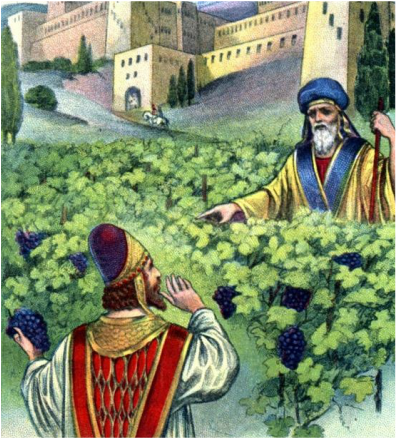
The story of King Ahab (and Queen Jezebel) and Naboth's vineyard is a tale of royal greed contrasted with humble gratitude. The result is the contrived execution of Naboth and the fraudulent taking of his vineyard by the royals.
Ahab wants that vineyard, asks for it, and offers a variety of forms of compensation to Naboth. On the other hand, Naboth recognizes the inherited blessing of this land, viewing it as a sacred trust from God that extends for generations in his family. It's as if he feels that he really doesn't own the land to be able to give it to the King (or anyone else) for any price. (There are all kinds of metaphors here about God's covenant and promise with Israel and indifference and hostility by national leadership to the covenant.) Naboth's spirit of gratitude collides with the spirit of greed from the royals, with terrible consequences for him.
In Galatians, we resume Paul's angry letter that addresses how the Torah-Law should be seen in the light of Jesus Christ. Paul is furious that Peter had waffled in the face of pressure by emissaries from Jerusalem who insisted that the Torah-Law's restrictions continue among "Jesus people," once again separating Jews and Gentiles when eating as a community - the celebratory meal being a key element in the life of the earliest church. Paul's philosophical (or theological) objections to Peter's conduct is severe.
Find out how this all works out as individuals who seek what they cannot obtain on their own leads to a lesson about grace. Check out the sermon video below. I failed to position the camera correctly, so you see a lot of arms and chest, but little of the preacher's head. Oh, well. Check it out anyway! And note the downloads below the video panel.
| 06-12-16-ff-answers.pdf |
| 06-12-16-within_the_law.pdf |
